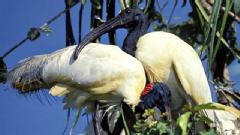
Scientists believe poisonous metal compounds entering the food chain can affect sexuality, causing a reduction in offspring.
They found that even relatively low levels of methylmercury in the diet of male white ibises caused the birds to pair up with each other, snubbing females.
Methylmercury is a form of mercury, the metal which is liquid at room temperature and is better known as quicksilver. It has been seeping into groundwater from industry for years.
This is the first scientific study to show how the pollutant appears to alter sexual preference.
U.S. researcher Peter Frederick captured 160 young white ibises – a coastal wading bird, and gave them food laced with methylmercury.
The birds were split into four groups. One group ate food with 0.3 parts per million (ppm) methylmercury, which most U.S. states would regard as too high for human consumption.
A second group was fed 0.1 ppm, and the third 0.05 ppm, a low dose that wild birds would be exposed to frequently. The fourth group received food clear of the poison.
All three dosed groups had significantly more homosexual males than the control group. Male-male pairs courted, built nests together and paired off for several weeks.
Higher doses increased the effect, with 55 per cent of males in the 0.3 ppm group affected.
Overall, male-male mating was blamed for 81 per cent of unproductive nests in the dosed groups.
‘We knew mercury could depress their testosterone levels,’ explained Dr Frederick.
‘But we didn’t expect this. In the worst-case scenario, the production of young would fall by 50 per cent.’ Other birds would probably be similarly affected, he said.
However, Dr Frederick, of the Florida University, and fellow researcher Nilmini Jayasena, of the Peradeniya University, Sri Lanka, admitted it was far from clear if methylmercury could be linked to similar effects in mammals.
by David Livingstone

